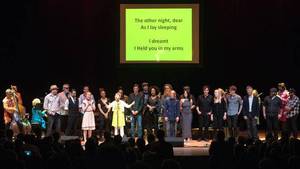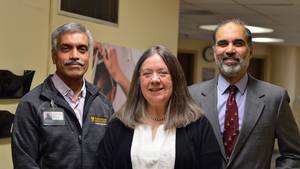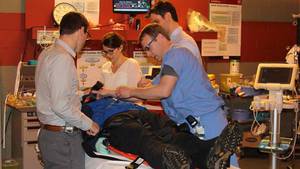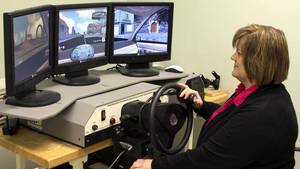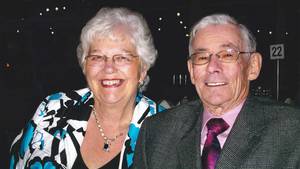Standing vigil at a young accident victim’s bedside, his hands gripping the hand of a family member, David Maginley recites the Lord’s Prayer.
He asks for stories about the young man, now approaching death, and talks with the family about their love for their son, his love for them and how that love is undying and pure.
David is comfortable with death, but it still catches his breath. He’s a cancer survivor four times over and a near-death experience has motivated him to spend his career guiding the sick and the dying through dark days.
“A cancer diagnosis makes you address the business of life and suffering, and it makes you engage mortality,” David says. “By its nature, it makes you grow in so many ways you’re not aware of.”
A Lutheran minister who found his calling as a spiritual counsellor at the QEII Health Sciences Centre, David explains that he works with those who follow any faith, or no faith at all. His works focuses on spirituality rather than religion.
“Religion is a group of people who follow the same doctrine or expression of spiritual truths. Spirituality is our fundamental life force, focused on the deepest values and meanings by which we live our lives. We are all spiritual beings.”
Spiritual counsellors are an on-call resource at the QEII and most major hospitals. If an individual is interested in spiritual counselling, a bedside companion or to dive deep into uncovering the meaning of life, David and his colleagues are called to offer a compassionate presence and open mind.
“We’re there to help a person connect to their inner strength and realize they can face their diagnosis,” David says. “They can use this crisis to deepen their humanity and make their life even bigger than it was before.”
In his conversations, David will ask key questions to tap into a person's spirituality.
“For cancer patients, that question is often opened up when they confide in me that they know they’re going to die. Then, I’ll ask questions like, ‘Do you know how long you have?’, ‘What do you think it will be like?’ and ‘Where would you like to be?’ So, we’re actually getting into plan of care and advanced directives. I’m quite casual about the questions, but always honour the person.”
After 18 years of standing vigil with the sick and dying, David responded to a long-heard call to write. His first book,
For David, the exercise in writing was a long time coming. It was a signal that his life’s work is not yet close to being done.
“I had this deep sense of knowing I had a book in me and I had been procrastinating for 10 years,” David says. “I needed to process the emotional cholesterol and when the words finally came, I knew it was going to have four threads: one thread on my cancer, one of the patient’s stories, one thread of how to use cancer to do the homework of life and one thread on what life is all about.”
Garner Hill met David in February 2017. What was first believed to be a nasty flu quickly devolved into leukemia. Garner, a former IT professional who journaled and documented his cancer journey, says he appreciated David’s heart-led approach.
Garner had dedicated his life to staying in shape and when he found himself researching bone marrow biopsies, he knew he needed more to focus on. His three children remained at the forefront of his mind and motivation, and he says it was David’s book, in particular, that helped guide him through a scary season.
“I was in the QEII for a month and you just really start to ask yourself the hard questions. You think about who you’ll leave behind,” Garner says.
Garner, now in remission, met David in between blood transfusions and was inspired to tap back into his spiritual upbringing. He says he soaked up the wisdom and advice.
“When I met David, before I read his book, he didn’t tell me that he’d had a near-death experience or even cancer,” Garner says. “When I read it, I realized he could talk the talk, as it were. I was a big fan.”
Whether his interactions with patients happen once or last the entire cancer journey, David says his main goals are to help patients feel heard, find compassion for themselves and that they live authentically, even if they may never leave the hospital.
“I name the realities: life and death, hope and grief, love and sorrow. You want to help people be real. And what people really want is a heart connection,” David says. “When we feel deeply loved, we feel safe and we can be real.”
To honour those who helped David write his story, 15 per cent of the book’s proceeds will support cancer care at the QEII.


